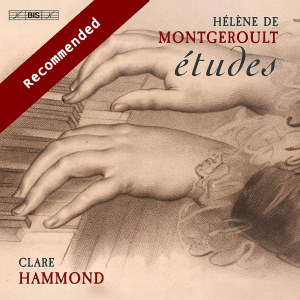
Hélène de Montgeroult (1764-1836)
29 Études from the Cours complet pour l’enseignement du forte-piano (1788-1812)
Clare Hammond (piano)
rec. 2021, Wyastone Concert Hall, Monmouth, UK
BIS BIS-2603 SACD [71]
I am ashamed to say that I had not heard of Hélène Antoinette Marie de Nervo de Montgeroult until just a couple of months ago, when BBC Radio 3 presented her as This Week’s Composer. The interest in recording her music arose after Jérôme Dorival published his biography Hélène de Montgeroult: La Marquise et la Marseillaise (Symétrie, Lyon 2006). It seems that Clare Hammond also had not really met the composer before she embarked in 2019 on “an intensive study” of her music for a year.
The pieces on this programme come from the composer’s pedagogical magnum opus Cours complet l’enseignemet du forte-piano, first published probably in 1816. It contains 972 exercises, 114 Études and a handful of other pieces. Earlier, she published three sets of three piano sonatas.
Hélène de Mongeroult’s biography is like no other. She and her husband were once kidnapped. She was arrested twice, and might have been executed had she not entranced her accusers with a tear-jerking improvisation on the Marseillaise. She underwent various other hardships but lived to be a good age.
Mongeroult was born just eight years after Mozart. Perhaps No. 52 is Mozartian and No. 65 is a taste of Domenico Scarlatti, yet you soon realise that her music is often far ahead of its time. You will occasionally think that you are listening to early Beethoven as, aptly, in No. 74 and No. 62. Sometimes Mendelssohn pays a visit, as in No. 53, and certainly Schumann, for example in No. 66. It is suggested that Robert and Clara Schumann would certainly have known this music, but, and here’s the rub, they never mention it. Chopin easily comes to mind in the virtuosic No. 100. I even thought of Brahms now and again. But it does not matter which other composer might pop into your head. This is outstanding music at any price, and should be in any pianist’s repertoire.
Each Étude has a short descriptor. No. 66 comes with more detail than others: “de main gauche, pour apprendre à chanter en se croisant la droite” (“left hand, to learn to sing with the right hand crossed”, a rare request for the period). Montgeroult slightly favours minor keys, and those Études seem the most striking. In many of them, she makes every effort to forge a singing line across, quite often, very active accompanimental figures.
The prolific Clare Hammond, who also wrote the excellent booklet notes, has made this truly a pet project. Some of Montgeroult’s Études have been recorded before (in 2011 on Éditions Hortus and in 2017 on Orchid Classics), as have been her piano sonatas (in 2021 on Grand Piano). This disc will doubtless contribute to a real breakthrough for her reputation.
Gary Higginson
Help us financially by purchasing from



Previous review: Nick Barnard (November 2022)
Contents
Étude No.37 in G major
Étude No.36 in F major
Étude No.35 in C minor
Étude No.34 in F major
Étude No.28 in E major
Étude No.26 in G major
Étude No.38 in A minor
Étude No.41 in E flat major
Étude No.51 in F minor
Étude No.53 in E minor
Étude No.52 in C major
Étude No.55 in F minor
Étude No.66 in C minor
Étude No.62 in E flat major
Étude No.65 in E flat minor
Étude No.67 in B major
Étude No.74 in C minor
Étude No.89 in A flat minor
Étude No.82 in C minor
Étude No.97 in G minor
Étude No.99 in C minor
Étude No.100 in B flat minor
Étude No.101 in C sharp major
Étude No.103 in F sharp minor
Étude No.106 in B major
Étude No.104 in G sharp minor
Étude No.107 in D minor
Étude No.110 in A major
Étude No.111 in G minor

















